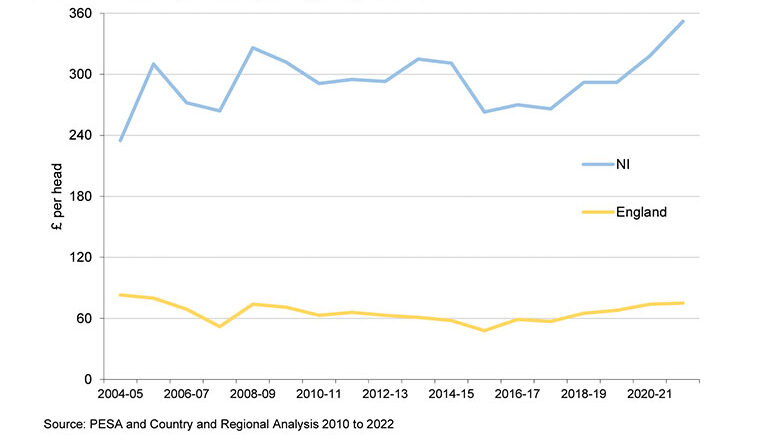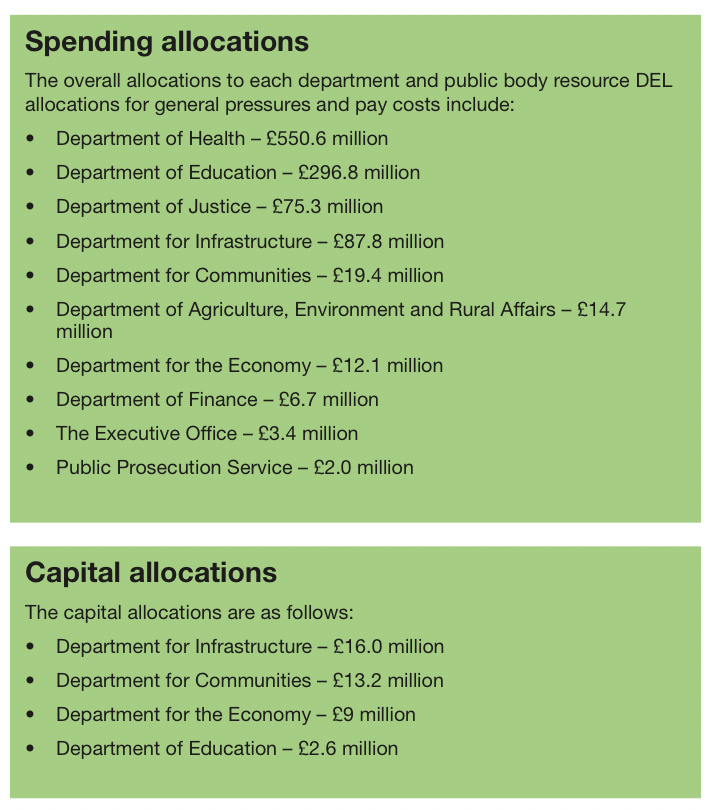Meeting Northern Ireland’s spending needs

As a new Executive takes the reins of Northern Ireland’s finances, the Minister for the Economy and the Minister of Finance have set out their visions for the local economy.
Analysis from the Northern Ireland Fiscal Council states that Northern Ireland needs £124 per head for every £100 per head spent in England.
Although Northern Ireland has higher public spending needs than the UK average, the most recent figures available show that while public spending in Northern Ireland is indeed above the UK average, that level is considerably lower than the need outlined by the Fiscal Council.
According to the House of Commons Library, in 2022/23, public spending per person in the UK as a whole was £12,549. Northern Ireland currently has the second highest level of public spending per head out of the four constituent parts of the UK, at £14,453 (15 per cent above the UK average).
This is slightly below Scotland, which has a public spend per head of £14,456, 15 per cent above the UK average. In England, public spending per head is £12,227 (3 per cent below the UK average), and in Wales, public spending per head is £13,967 (11 per cent above the UK average).
Spending allocations
When Caoimhe Archibald MLA assumed the role of Minister of Finance, she outlined her allocation of the £1.045 billion in new monies made available under the Executive Restoration package and announced that £688 million of this finance is to be allocated to pay rises for public sector workers, who are the lowest paid out of all regions in the UK and Ireland. £22 million of this resource funding was also available from the Executive’s own funds.
Separate to the Executive Restoration Agreement funding, £83.5 million of available capital DEL funding was also agreed for allocation. £40.9 million of this will be allocated to departments for capital projects, £42.6 million has been allocated to the Department of Education, and £30,000 to the Public Prosecution Service to meet capital overspends.
On the capital allocations, Archibald said: “The Executive has agreed £40.9 million of new capital funding allocations today to provide much needed investment in housing, education, and infrastructure projects. This funding will also see investment in research and innovation in higher education.”
Concluding, Minister Archibald said: “While the allocations today will provide much relief to our public sector workers and help offset the pressures facing departments, we must be clear that significant challenges exist across all areas of our public services. Having to complete this process at this time in the financial year has compounded the pressure.
“I will continue to press Treasury to provide sufficient funding based on our level of needs which enables us to invest in and reform our public services.”
Towards a 10X economy?
Setting out his vision for the economy, new Minister for the Economy Conor Murphy MLA made no specific reference to the 10X strategy, the economic strategy which Executive departments have been implementing since its publication in May 2021.
Speaking in the Assembly, Murphy set out four key priorities as part of a “new economic mission”. He said: “One objective is to create good jobs. Many workers and their families are denied a decent standard of living. We must change this by investing in affordable childcare and by strengthening trade unions, particularly in low-paid industries.
“A third objective is to promote regional balance. Everyone, no matter where they live, should have the same opportunity to earn a living. To achieve this, I will fund local economic strategies and prioritise projects that promote regional balance, such as the expansion of the Magee campus.”
Another objective is to raise productivity, and the Minister explained: “Productivity is a fundamental driver of overall living standards. We can improve our productivity by using dual market access to grow domestic exports and attract highly productive investment. Investment in skills, research and development, and innovation will also drive better productivity.
“My final, critical objective is to reduce carbon emissions. Reaching net zero by 2050 is a legal requirement and a moral obligation to the wellbeing of future generations. Done right, the transition can also generate prosperity for all.”
The 10X economy strategy is guided by the 10X objectives, grouped into three pillars of activity: innovation, inclusive growth, and sustainability. Published in May 2021, the strategy document states that the “concept of 10X… embraces innovation to deliver a ten times better economy”.
Concluding his statement to the Assembly, Murphy asserted that there is a need to “move quickly” to realise this new economic vision and said: “My department will move at pace to put this vision into action. Its focus will be on delivery. We have a lot of work to do to turn this economy around and that work starts now.”
Historic per head speading on agriculture







